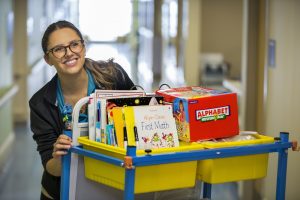In 2019, the state restored funding to Patient Academic Services, but the program relies on philanthropy to withstand any future state budget issues. Donors include Suncoast Credit Union, the Tampa Bay Buccaneers, Children’s Miracle Network Dance Marathon, and Extra Life. Individual donors, too, make a difference. Through the John H. Moser Trust, Crystal Moser McCormick pledged $100,000 to support Patient Academic Services in honor of her mother.
“My mom used to be a teacher, and I really valued and was blessed to have her to help me when I was growing up,” she says. “When I learned that [ACH] had teachers on staff to try not only to help the children keep up but give them a break from all the round-the-clock doctors, it really spoke to me. I see the kids’ involvement and how much they really look forward to having those breaks with [an education] specialist. It makes their day.”
Additional donors can help bring the program to more children, increase programming, and create an all-day outpatient tutoring program for patients dealing with Crohn’s disease, diabetes, cystic fibrosis, and renal and cardiac issues.
“We’ve learned [children are] equally, if not more, at-risk because they’re living with those illnesses at home without the supports of the hospital,” Maier says. “We would love to have a space somewhere where kids could come all day, every day to be served.”
“We Cannot Describe How Grateful We Are”
Kate Loguercio, a Patient Academic Services teacher, experienced health issues in her youth, so she understands the stresses these children face.
“When they say ‘I don’t like school, I’m not good at it,’ you understand why,” she says. “Most kids don’t have to worry about the things that these kids have to worry about. I try to help them understand this is how it is now, but it’s not always going to be this way.”
She recalls one overwhelmed high school student going through a bone marrow transplant who had fallen a year behind in school. Loguercio worked with his teachers to whittle assignments down to the most critical, transforming an intimidating list into a manageable set of tasks. He graduated on time with his class. Then there was the 7-year-old whose mother still keeps in touch with Loguercio, letting her know he’s now in gifted classes.
“I think he always had that in him, but we were able to foster that love of education at the hospital as well,” Loguercio says.
In Ramos’ case, Patient Academic Services teachers advised him to keep his son, Garcia, in his classes — and they could help. Garcia attended one-on-one tutoring twice a week in the outpatient lab and his grade in math — his most difficult class — rose from a C to an A.
“I showed Ms. Kendall [Williams] and Ms. Veronica [Cetnar] two weeks ago ― ‘Look at the report card! It’s completely different,’” Ramos says. “We cannot describe how grateful we are for the help we’re receiving from these two teachers.”
Garcia now focuses on the future ― on returning to normalcy and to school.

